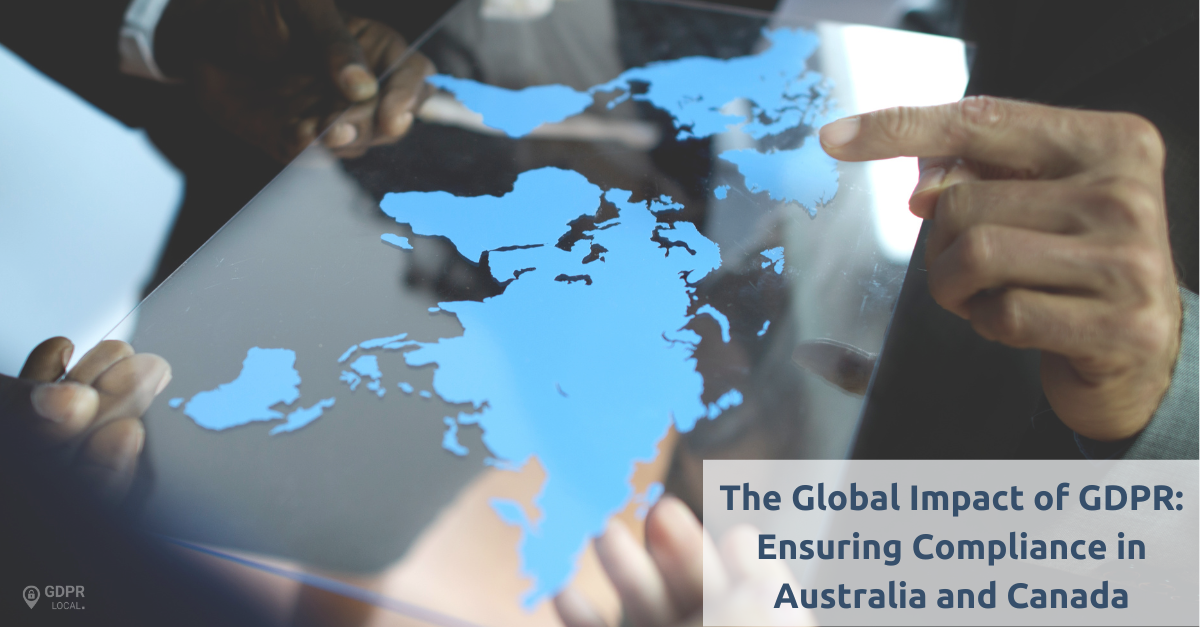
The Global Impact of GDPR: Ensuring Compliance in Australia and Canada
The General Data Protection Regulation (GDPR) implemented by the European Union (EU) has set a global standard for data privacy and security. While GDPR primarily focuses on EU member states, its impact extends far beyond Europe. Countries like Australia and Canada have also implemented their own regulations to protect the privacy and security of personal data similar to the compliance of GDPR.
In this guide, we will explore the GDPR compliance requirements in Australia and Canada. We’ll cover key aspects of each country’s data protection regulations, similarities and differences with GDPR, and how companies can ensure compliance. Additionally, we will discuss the role of our business – GDPRLocal, in helping Australian and Canadian companies navigate and maintain regulatory compliance.

Data Protection Regulations in Australia
Overview of Australian Privacy Laws
Australia has a robust framework for data protection, governed primarily by the Privacy Act 1988 (Cth) and overseen by the Office of the Australian Information Commissioner (OAIC). The Privacy Act sets out the Australian Privacy Principles (APPs), which regulate the collection, use, disclosure, and storage of personal information by Australian organizations.
Key Similarities and Differences with GDPR
While GDPR and the Australian Privacy Act share a common goal of protecting personal data, there are notable differences between the two frameworks. One significant difference is the extraterritorial scope of GDPR, which applies to any organization that processes personal data of individuals residing in the EU, regardless of the organization’s location. In contrast, the Australian Privacy Act primarily applies to Australian organizations and certain foreign entities operating in Australia.
Key Requirements for GDPR Compliance in Australia
To achieve GDPR compliance in Australia, organizations need to assess their data processing activities and align their practices with GDPR principles. Key requirements for GDPR compliance in Australia include:
Lawful Basis for Processing: Organizations must identify a lawful basis for processing personal data, such as consent, contractual necessity, legal obligations, or legitimate interests.
Data Subject Rights: Individuals have the right to access, rectify, delete, and restrict the processing of their personal data. Organizations must have mechanisms in place to facilitate these rights.
Data Breach Notification: In the event of a data breach that poses a risk to individuals’ rights and freedoms, organizations must notify affected individuals and the OAIC without undue delay.
How Can We Help Australian Companies Achieve GDPR Compliance
We will design a comprehensive data protection compliance solution, so we can assist you. We offer a range of features tailored to the unique requirements of Australian organizations, including:
Data Mapping and Inventory:
We will create a detailed inventory of personal data flows, enabling businesses to identify potential compliance gaps and implement appropriate safeguards.
Consent Management:
Our platform allows organizations to manage consent effectively by capturing and recording consent information, providing individuals with transparency and control over their personal data.
Data Subject Rights Management:
We streamline the management of data subject rights, enabling organizations to efficiently respond to data subject requests, such as access, rectification, and erasure.
Data Protection Regulations in Canada
Overview of Canadian Privacy Laws
Canada has its own set of privacy laws, with the Personal Information Protection and Electronic Documents Act (PIPEDA) being the primary legislation governing the collection, use, and disclosure of personal information in the private sector. PIPEDA applies to organizations engaged in commercial activities across all Canadian provinces.
Key Similarities and Differences with GDPR
Similar to Australia’s privacy framework, PIPEDA shares common principles with GDPR but also has some key differences. One notable difference is PIPEDA’s application to the private sector, whereas GDPR applies to both public and private sectors. Additionally, PIPEDA does not have the same extraterritorial reach as GDPR, focusing primarily on organizations operating within Canada.
Key Requirements for GDPR Compliance in Canada
To achieve GDPR compliance in Canada, organizations should align their data protection practices with GDPR principles. Key requirements for GDPR compliance in Canada include:
Accountability and Governance: Organizations must demonstrate accountability for their data processing activities and implement appropriate governance mechanisms.
Data Minimization: Organizations should minimize the collection and retention of personal data to what is necessary for the intended purposes.
International Data Transfers: When transferring personal data outside of Canada, organizations must ensure appropriate safeguards are in place, such as standard contractual clauses or binding corporate rules.
How Can We Help Canadian Companies Achieve GDPR Compliance
What do we offer for Canadian Companies?
Privacy Impact Assessments:
We assist organizations in conducting privacy impact assessments (PIAs) to identify and mitigate privacy risks associated with data processing activities.
Cross-Border Data Transfer Management:
Our platform helps organizations comply with GDPR’s requirements for international data transfers by facilitating the implementation of appropriate safeguards and ensuring compliance with European data protection standards.
Data Protection Officer (DPO) Support:
Our expert guidance and support in appointing and fulfilling the responsibilities of a Data Protection Officer, will help you complete a key requirement under GDPR.
Conclusion
Maintaining compliance with global standards like GDPR is crucial for organizations operating in Australia and Canada. The complexities of these regulations require solutions like to ensure compliance and mitigate the risk of penalties.
By leveraging our features and services, GDPR compliance in Australia and Canada is easy. Gain a competitive advantage, and demonstrate their commitment to protecting individuals’ personal data.
Ensure your business remains compliant with GDPR and protect your customers’ data. Contact us today to learn more about our comprehensive data protection compliance solutions.